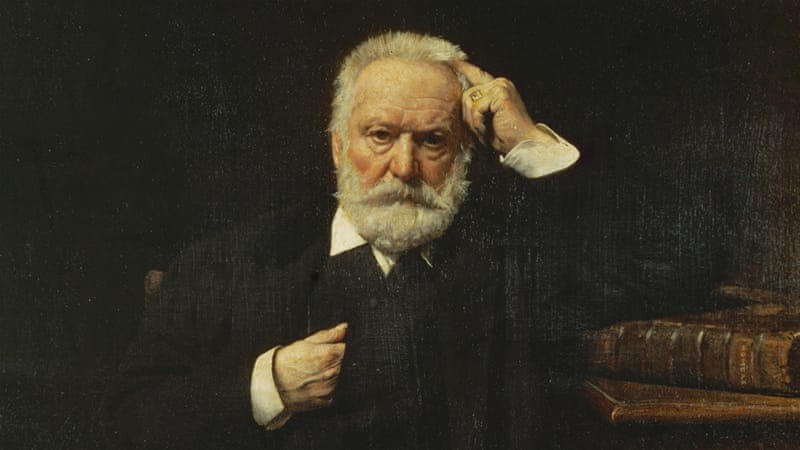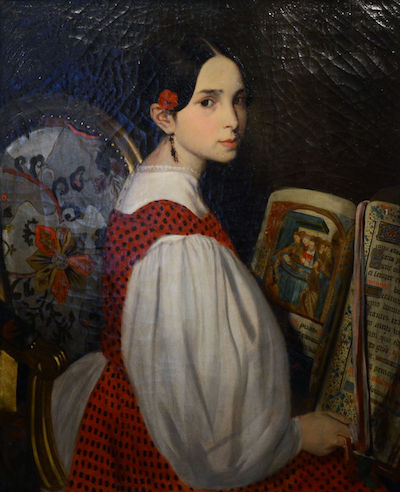Les Misérables Chapter-a-Day Read-along: Happy 216th Birthday, Victor Hugo!

Today is February 26, the birthday of Victor Hugo. On this day 216 years ago, Victor Hugo was born to Joseph Léopold Sigisbert Hugo and Sophie Trébuchet.
More importantly to me, this also happens to be the birthday of both my mother, Mrs. Senger, and my wife, Dr. Senger, two people who mean much more to me than Victor Hugo ever could. Happily, both are participating in the Les Misérables Chapter-a-Day Read-along. So if you are feeling deprived of the ability to wish Victor Hugo a happy birthday, please feel free to send felicitations to Dr. Senger and Mrs. Senger in a comment!
I find it very interesting that the chapter scheduled for today in the read-along (Volume 1, Book 7, Chapter 3: A Storm in the Mind) is perhaps one of the greatest chapters in the entire book. It is certainly one of my personal favorites, and I wonder if you liked it as well. The sea and star imagery makes its appearance once again, and the inner conflict Madeleine goes through is agonizing. I find this chapter to be a simply brilliant piece of writing.
Is it too much to think that, since Hugo wrote the book to have exactly 365 chapters, he would have deliberately planned that this chapter be read on his birthday? I wonder if there are any other chapters that fall on coincidental dates.
In any case, to commemorate Hugo’s birthday, here are a few interesting facts about his birth and life:
-

Hugo’s beloved daughter Léopoldine, painted by Auguste de Châtillon in 1836
When Victor was 19 years old, his father wrote to him “that he had been conceived on one of the highest peaks in the Vosges Mountains, on a journey from Lunéville to Besançon. ‘This elevated origin,’ he went on, ‘seems to have had effects on you so that your muse is now continually sublime.'”
- “Hugo was born on 26 February 1802, but because he was a slightly premature baby, he always believed he had been conceived on 24 June 1801. Valjean’s prison number on his first incarceration at Toulon is 24601.” – David Bellos, The Novel of the Century
- Victor married Adèle Foucher in 1822, and they had five children.
- Perhaps the greatest tragedy of Victor Hugo’s life was the death of his beloved daughter Léopoldine in 1843 at the age of 19. Léopoldine drowned when her boat overturned and her heavy skirts pulled her down. What makes her tragic death even more heartbreaking is that she was pregnant at the time and her husband Charles also drowned trying to save her and their unborn child.
- Four years after Léopoldine’s death, Hugo wrote what would become one of France’s most famous poems, “Demain, dès l’aube” (“Tomorrow, at Dawn”). In the poem, Hugo describes a visit to Léopoldine’s grave. Here it is in translation:
Tomorrow, at dawn, at the hour when the countryside whitens,
I will set out. You see, I know that you wait for me.
I will go by the forest, I will go by the mountain.
I can no longer remain far from you.I will walk with my eyes fixed on my thoughts,
Seeing nothing of outdoors, hearing no noise
Alone, unknown, my back curved, my hands crossed,
Sorrowed, and the day for me will be as the night.I will not look at the gold of evening which falls,
Nor the distant sails going down towards Harfleur,
And when I arrive, I will place on your tomb
A bouquet of green holly and of flowering heather.
- Hugo fought a lifelong battle to abolish the death penalty, for which he was internationally renowned.
- He also founded the Association Littéraire et Artistique Internationale, an associated dedicated to protecting writers’ and artists’ rights. Under’s Hugo’s urging, the association’s work led to the Berne Convention for the Protection of Literary and Artistic Works, an international agreement governing copyright.
- Hugo wrote the libretto to Bertin’s opera La Esmerelda, which was based on the character from Hugo’s The Hunchback of Notre Dame.
Happy Birthday, Victor!
































Happy Birthday Brenda and Mrs. Sanger!!!…and Victor!
Happy Birthday to all! I haven’t read today’s chapter yet but will keep the fact that this is his birthday in mind!
Happy Birthday to Mrs. Senger and Dr. Senger…and to Victor Hugo!
Happy Birthday Victor, Mrs & Dr Senger’s! What a momentous day in the Senger household! (I celebrate my special day with Boris Pasternak, my love of Dr Zhivago makes this rather special to me 🙂
I’m fascinated by Hugo’s deliberate act of making this book to be read a chapter a day for a year. It’s hard to imagine that he didn’t therefore create meaningful chapters for significant dates.
Are there any other authors who have deliberately (or not) created a book with 365 chapters?